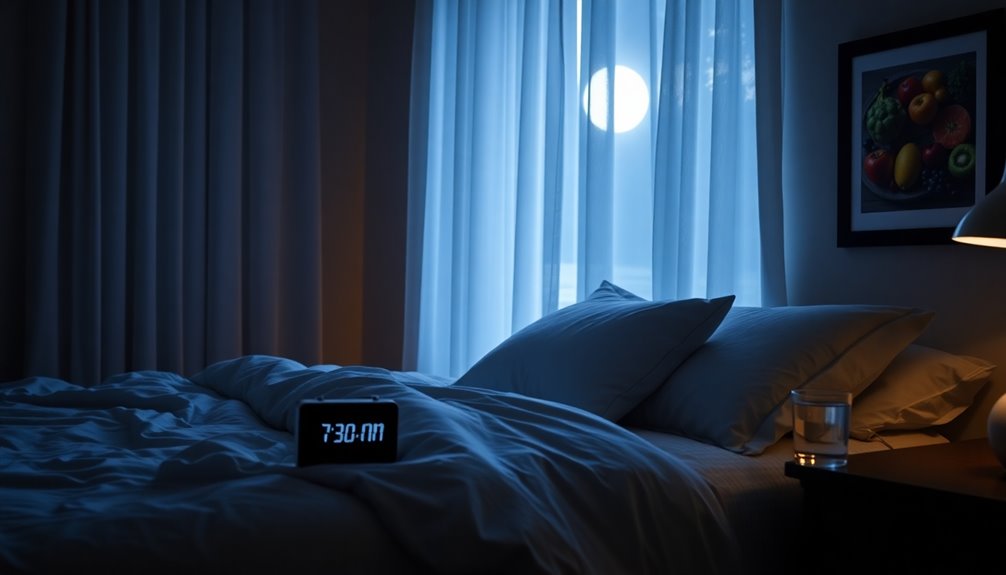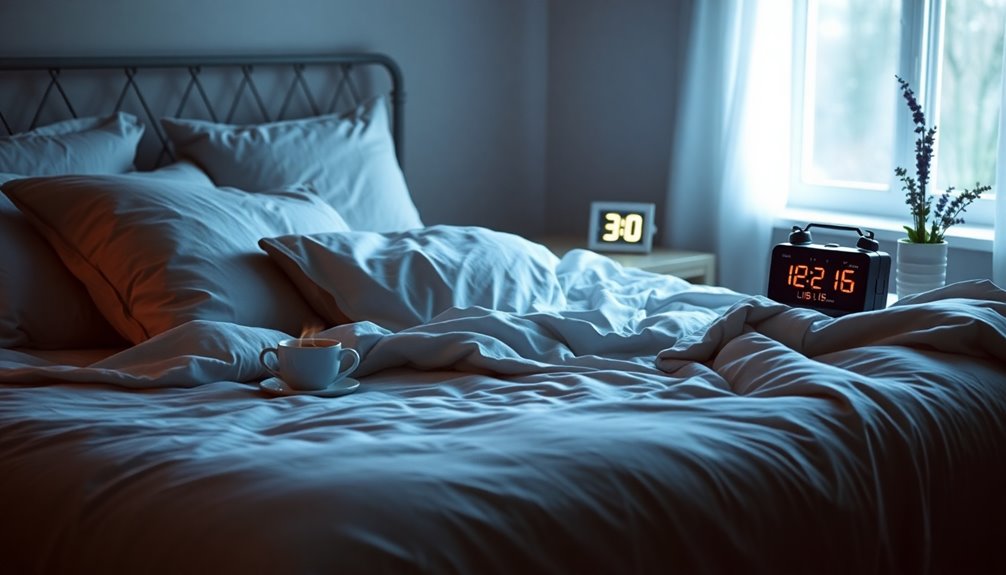Sleep is essential for overcoming weight loss plateaus as it directly impacts your metabolism and hunger hormones. When you don't get enough sleep, appetite increases due to elevated ghrelin levels and decreased leptin, leading to cravings for high-calorie foods. Sleep deprivation also slows your metabolism, making it harder to burn calories effectively. By prioritizing both the quality and quantity of sleep, you can improve your weight management efforts. Establishing a consistent sleep schedule and creating a soothing bedtime routine can enhance your rest. Want to learn how to optimize your sleep environment for better results?
Key Takeaways
- Quality sleep regulates hunger hormones, balancing ghrelin and leptin to help curb cravings and support weight loss efforts.
- Sleep deprivation slows metabolism, making it harder to burn calories and contributing to weight loss plateaus.
- Inconsistent sleep patterns can disrupt deep sleep cycles, hindering recovery and motivation for exercise, crucial for overcoming plateaus.
- Establishing a consistent sleep schedule enhances sleep quality, which is vital for maintaining an active lifestyle and effective weight management.
- Creating a sleep-friendly environment minimizes disturbances, promoting restorative sleep necessary for effective weight loss and overcoming plateaus.
The Science of Sleep and Weight Loss

Sleep plays a central role in your weight loss journey, influencing everything from metabolism to hunger hormones. When you experience sleep deprivation, your body goes through several changes that can impede your efforts to shed those extra pounds. Lack of sleep can lead to an increase in appetite, especially for high-calorie, sugary foods. This craving arises from hormonal imbalances; specifically, your levels of ghrelin, the hunger hormone, rise, while leptin, which signals fullness, falls.
In essence, when you don't get enough shut-eye, you're more likely to overeat, contributing to potential weight gain. Studies show that people who consistently sleep less than seven hours a night tend to have a more challenging time maintaining a healthy weight compared to those who prioritize rest.
Moreover, sleep deprivation can impact your energy levels and motivation, making it tougher to stick to your exercise routine. When you're fatigued, you might choose to skip the gym or opt for a more sedentary lifestyle, further impeding your weight loss progress. Additionally, insufficient sleep can hinder your ability to engage in effective exercise and workouts tailored to individual goals, which are crucial for weight loss success.
To support your weight loss efforts, aim for 7-9 hours of quality sleep each night. Creating a calming bedtime routine, limiting screen time before bed, and keeping your sleep environment comfortable can significantly enhance your sleep quality. Remember, prioritizing sleep isn't just about feeling rested; it's a vital component of achieving your weight loss goals and maintaining overall well-being.
How Sleep Affects Metabolism

When you don't get enough quality rest, your metabolism can take a hit, making weight loss even more challenging. Sleep deprivation not only affects how you feel but also plays an essential role in regulating your metabolic rate.
When you're short on sleep, your body may not process energy as efficiently, leading to a slowdown in metabolism. This means that even if you're sticking to your diet and exercise routine, you might find it harder to shed those stubborn pounds.
Research shows that inadequate sleep can lead to a decrease in your basal metabolic rate (BMR)—the number of calories your body burns at rest. When you're sleep-deprived, your body can also struggle to use glucose effectively, increasing the risk of insulin resistance. This disruption can lead to weight gain and make it tougher to lose weight, especially if you're already facing a plateau.
Furthermore, poor sleep can lead to fatigue, making it more difficult to stick to your workouts and maintain an active lifestyle. You might find yourself craving high-calorie comfort foods, which further complicates your weight loss efforts. Additionally, optimizing your oxygen intake can enhance your metabolism and further support your weight loss journey.
To combat these effects, prioritize getting 7 to 9 hours of quality sleep each night. Create a sleep-friendly environment by minimizing distractions and establishing a bedtime routine. By making sleep a priority, you'll support your metabolism and improve your chances of overcoming that weight loss plateau. Remember, rest isn't just a luxury; it's a crucial part of your weight loss journey.
The Impact of Sleep on Hunger Hormones

How does a lack of quality rest influence your hunger hormones? Sleep deprivation can lead to a significant hormonal imbalance, particularly affecting ghrelin and leptin—two hormones that play vital roles in regulating your appetite. When you don't get enough sleep, your body produces more ghrelin, which stimulates hunger, while simultaneously decreasing leptin, the hormone that signals fullness. This imbalance can make it incredibly challenging to stick to your weight loss goals.
Consider these three impacts of sleep deprivation on your hunger hormones:
- Increased Appetite: With elevated ghrelin levels, you'll likely feel hungrier, making it harder to resist those late-night snacks or second helpings.
- Cravings for Unhealthy Foods: Lack of sleep often leads to cravings for high-calorie, sugary foods. This can derail your efforts and contribute to weight gain, further complicating your weight loss journey.
- Altered Metabolism: An imbalance in hunger hormones can disrupt your metabolism, making it less efficient at burning calories. This can stall your weight loss progress, pushing you into a frustrating plateau.
Additionally, understanding the impact of sleep on hunger hormones can provide valuable insights into breaking through plateaus in your weight loss journey.
Understanding the connection between sleep and hunger hormones is essential for anyone looking to break through a weight loss plateau. Prioritizing quality sleep not only helps regulate your appetite but also supports a healthier lifestyle overall. So, make it a point to get those Z's and give your body the rest it deserves!
Sleep Quality vs. Sleep Quantity

What's more important for your weight loss journey: sleep quality or sleep quantity? It's a common debate, and the truth is, both aspects play a vital role in your overall success.
While you might think simply clocking in enough hours of sleep is sufficient, the quality of that sleep can greatly impact your sleep patterns and, ultimately, your weight loss efforts.
Research shows that sleep duration alone isn't sufficient if you're not getting restorative sleep. Poor quality sleep can leave you feeling groggy, affecting your motivation to exercise and make healthy food choices. On the flip side, even if you achieve the recommended 7-9 hours of sleep, if it's fragmented or restless, you may still experience challenges with weight loss.
Focusing on sleep patterns is important too. Consistent sleep schedules help regulate your body's internal clock, improving both sleep quality and duration. When you maintain a regular bedtime and wake-up time, you're more likely to experience deeper sleep cycles, which are essential for recovery and hormonal balance.
To support your weight loss goals, aim for a holistic approach. Prioritize both the amount of sleep you get and the depth of that sleep. Practicing deep breathing exercises can also enhance your ability to achieve restful sleep. By understanding the balance between sleep quality and quantity, you can create a sustainable routine that nurtures your body and mind, making it easier to push through that weight loss plateau. After all, you're part of a community working towards better health, and every small change counts!
Tips for Better Sleep Hygiene

Improving your sleep hygiene can greatly enhance both the quality and quantity of your rest, which is essential for breaking through weight loss plateaus. By adopting a few simple strategies, you can create a bedtime routine that promotes restful sleep and supports your weight loss efforts.
- Establish a Consistent Sleep Schedule: Go to bed and wake up at the same time every day, even on weekends. This helps regulate your body's internal clock, making it easier to fall asleep and wake up feeling refreshed.
- Incorporate Sleep Tracking: Use a sleep tracking app or device to monitor your sleep patterns. This data can provide insights into your sleep quality and help you identify areas for improvement, such as how long it takes you to fall asleep or how many times you wake up during the night.
- Limit Screen Time Before Bed: Reduce exposure to screens at least an hour before bedtime. The blue light emitted by phones, tablets, and computers can interfere with melatonin production, making it harder for you to drift off. Additionally, maintaining a strong core through dynamic exercises can enhance your overall energy levels, promoting better sleep quality.
Creating a Sleep-Friendly Environment

Creating a sleep-friendly environment is crucial for enhancing the quality of your rest and supporting your weight loss goals. Your sleep environment plays a significant role in how well you can relax and recharge. By optimizing your bedroom setup, you can encourage better sleep habits and make it easier to stick to a healthy bedtime routine.
Here are some practical tips for creating that ideal sleep environment:
| Element | Recommendation | Benefits |
|---|---|---|
| Lighting | Use blackout curtains or eye masks | Reduces light exposure |
| Temperature | Maintain a cool room (60-67°F) | Promotes deeper sleep |
| Noise Control | Use white noise machines or earplugs | Minimizes disturbances |
| Bedding | Invest in comfortable pillows and mattress | Enhances comfort |
Incorporating relaxation techniques into your evening routine can also help signal to your body that it's time to wind down. Consider activities like reading, gentle stretching, or practicing mindfulness meditation. These practices not only help create a calming atmosphere but also prepare your mind for sleep. Additionally, addressing the root cause of pain can further improve your overall well-being and sleep quality.
Frequently Asked Questions
Can Napping During the Day Help With Weight Loss?
Napping during the day can offer several benefits that may support your weight loss journey.
Research suggests that short naps can boost your metabolism, helping your body burn calories more efficiently.
By recharging your energy levels, you'll feel more motivated to stay active and make healthier choices throughout the day.
If you're struggling with fatigue, a quick nap might just provide the refreshment you need to maintain your weight loss goals.
How Much Sleep Do Adults Really Need for Weight Management?
Adults typically need seven to nine hours of quality sleep each night to support effective weight management.
Quality sleep enhances your body's ability to regulate hunger hormones, helping you make better dietary habits during the day.
When you're well-rested, you're more likely to stay active and resist cravings, leading to healthier choices.
Prioritize sleep as an essential part of your wellness journey, and you'll notice improvements in both mood and metabolism.
Does Sleep Duration Affect Exercise Performance and Recovery?
Sleep duration greatly affects your exercise performance and recovery. When you prioritize sleep quality, you enhance your body's ability to recover from high exercise intensity.
Studies show that getting enough sleep boosts muscle repair and improves endurance, making your workouts more effective. If you're not sleeping well, you might notice decreased performance and longer recovery times.
Can Sleep Disorders Hinder Weight Loss Efforts?
Yes, sleep disorders can definitely hinder your weight loss efforts. Poor sleep quality affects hormones that regulate hunger and appetite, leading to cravings and overeating. Studies show a strong weight loss correlation between adequate sleep and successful weight management.
If you're struggling with sleep issues, addressing them can greatly enhance your weight loss journey. Prioritizing restful sleep not only benefits your overall health but also helps you achieve your fitness goals more effectively.
Are There Specific Sleep Positions That Aid Weight Loss?
Imagine curling up in a way that not only soothes you but also nudges your weight loss journey forward. While no specific sleep posture guarantees weight loss, certain positions can boost comfort and restfulness, fostering a positive weight loss connection.
Sleeping on your side may help reduce snoring and improve breathing, which can enhance overall health. Prioritize quality sleep, and you'll be more energized to tackle your goals.
Conclusion
So, if you think trading in your beauty sleep for late-night snacks will help you shed those stubborn pounds, think again! Your metabolism isn't a caffeinated squirrel; it needs rest to function properly. By prioritizing quality sleep, you're not just dreaming of weight loss—you're actively working towards it. So, tuck yourself in, turn off the screens, and let your body do its magic. Who knew a cozy bed could be your secret weapon against that weight loss plateau?



